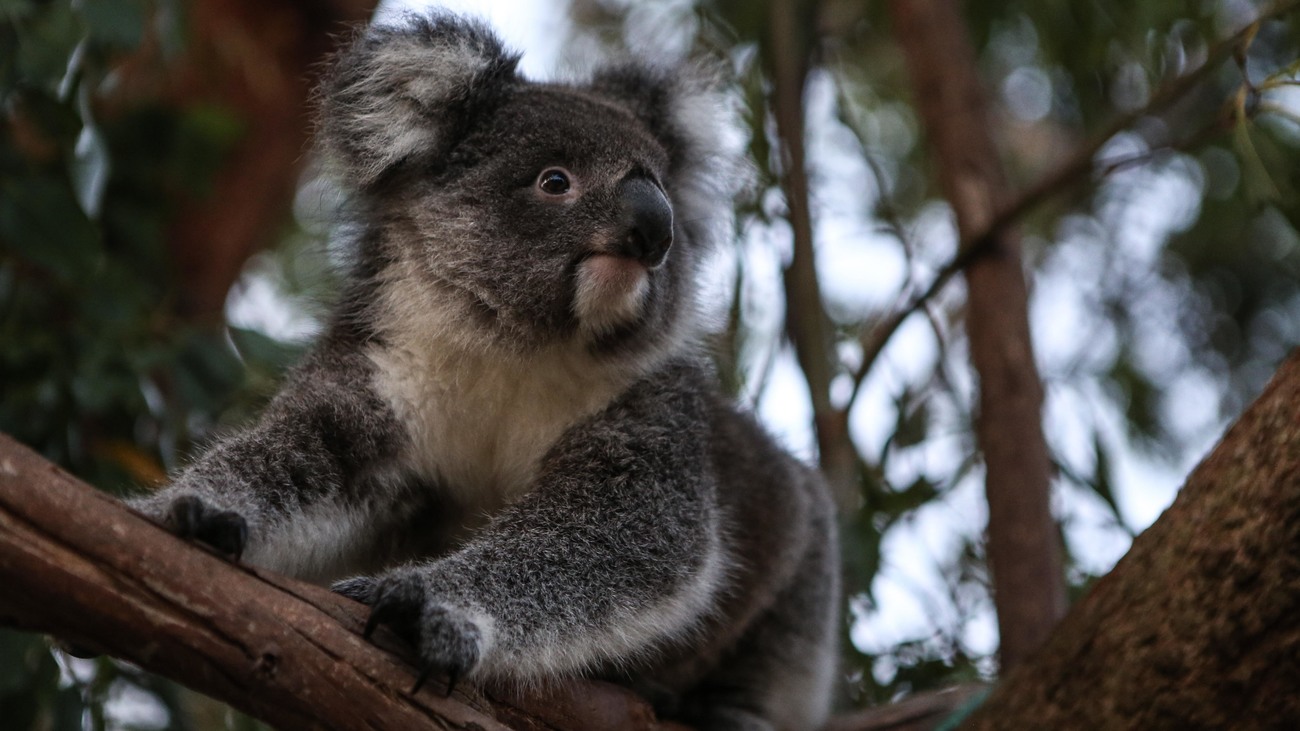Josey Sharrad
together we can help save Australia's koala populations
together we can help save Australia's koala populations

The iconic koala is one of the most beloved animals in the world. No one can deny this adorable ball of grey fur, big head with fluffy round ears, and of course that spoon-shaped black nose! Koala hands have two opposable thumbs, with unique fingerprints just like humans. They carry their babies in pouches like all marsupials. And they munch on eucalyptus trees so much that it’s almost impossible to smell a difference—even their scat smells of eucalyptus!
But koalas are also one of the top ten species most vulnerable to climate change according to the International Union for Conservation of Nature (IUCN). Particularly vulnerable to bushfires, koalas are slow moving and spend much of their time sleeping high in the treetops of gum trees that burn quickly and intensely. When fires sweep through their habitat, koalas often don’t have time to escape. Those that do escape often suffer from burns, smoke inhalation, and starvation and dehydration as they search for resources.
It’s a struggle to be a koala 365 days out of the year in fact. Habitat loss from land-clearing is the number one threat to koalas, and the east coast of Australia has one of the highest rates of deforestation of any country in the world – on a par with Brazil. Sadly, koalas often choose to live in the same sub-tropical coastal areas as humans, and this causes problems when we knock down their homes to build our own. Koalas are forced to live in the remaining trees in residential areas making them vulnerable to deadly encounters. As a result, collisions with vehicles and attacks by domestic dogs kill about 4,000 koalas every year.
The 2019/2020 Australian bushfires have left a lasting impact that will be difficult to recover from.
IFAW recently released a scientific report alongside the team at Biolink, revealing the true impact of the bushfires on koala populations across the state of New South Wales. At a minimum, 6,382 koalas are estimated to have been killed by these fires. This is a deliberately conservative estimate and real numbers are likely to be far higher. And two out of every three koalas have disappeared in the last twenty years. These fires could be the last straw. The report found that the state’s koalas are now facing an immediate and significant threat of extinction. This is an emergency and requires emergency measures.
We still have the chance to help.
With the eye-opening findings from this report, IFAW is calling on the government of NSW to take urgent action and “up-list” the state’s koalas from Vulnerable to Endangered on the NSW Endangered Species list. Such an up-listing would increase much-needed protections for koalas, like putting further restrictions on development plans that destroy vital habitat. Crucially, it would give them the breathing space needed in order to begin the process of recovery.
Alongside legal consultation from the Environmental Defenders Office (EDO) on the tools available to increase protection for koalas in NSW, IFAW submitted a nomination to the Threatened Species Scientific Committee, co-signed by Friends of the Koala, Humane Society International (HSI) and Port Macquarie Koala Hospital.
We’re currently seeking a provisional uplisting on an emergency basis which would take effect for two years, while a comprehensive assessment and protection plan is put in place. Our global voices have the power to solidify this protection for generations to come. Our koalas only stand a chance if we help. They are literally fighting for their survival. We need to lend them a helping hand; we owe them that at least.
Every individual matters when it comes to saving the population.
Our teams continue their work on the ground today, including carers and partners across NSW and beyond. We’re assisting with financial grants, veterinary care, medical equipment, enclosures and aviaries, emergency water stations for animals in the wild, and vital mental health support for those working tirelessly in the field, rescuing and rehabilitating animals around the clock.
We believe every individual animal matters when it comes to saving a species. Almost every animal coming into care over the past months is already compromised – dehydrated and malnourished from prolonged drought and excessive land-clearing. Our teams are rescuing, rehabilitating and even releasing bushfire-affected koalas back into the wild already, but we have the chance now to provide them with the greater respite and protections they need to recover.
Looking ahead
IFAW has been on the ground in Australia for 30 years, and when the fires subside, our teams will continue this important work. Core to our holistic approach, we’ve already begun the process of rebuilding and restoring damaged habitats. This includes ongoing endeavors to plant 250,000 eucalyptus trees by 2025 as part of a wildlife corridor initiative with our partners at Bangalow Koalas in the Northern Rivers Region of NSW.
Every one of us has a part to play in securing a future for koalas and the places they call home. It’s up to us to lay the seeds that will lay the firm foundation upon which to sustain our future. Every koala matters, every person matters, every tree matters. There is a way for people and koalas to thrive together. Let’s get to work.
Want to help? Join us in asking the government of New South Wales to list the koala as Endangered.
-Josey Sharrad, Wildlife Campaigner, IFAW Australia
Related content
Every problem has a solution, every solution needs support.
The problems we face are urgent, complicated and resistant to change. Real solutions demand creativity, hard work and involvement from people like you.